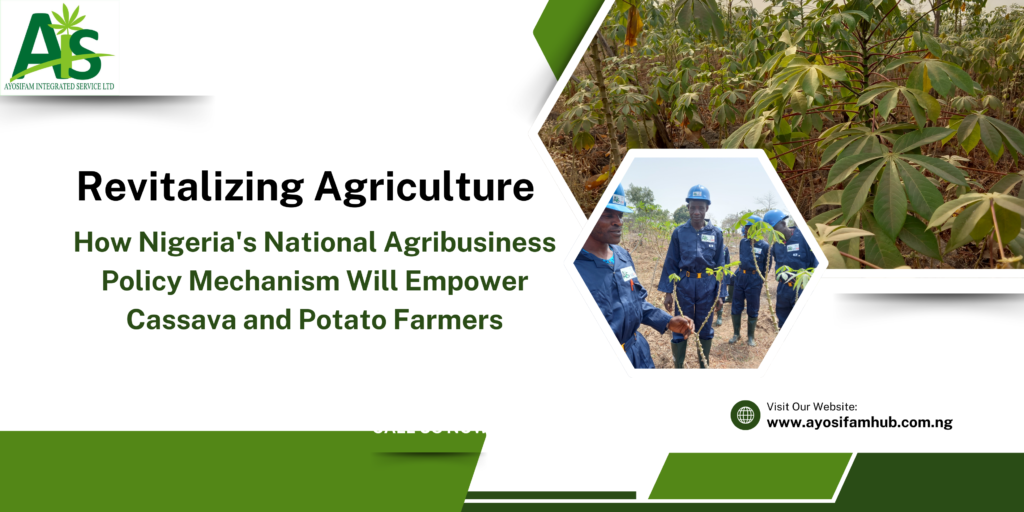The Federal Government of Nigeria is poised to launch a transformative initiative: the National Agribusiness Policy Mechanism (NAPM). This comprehensive framework aims to revolutionize the agricultural sector by boosting productivity, stabilizing volatile food prices, and ultimately driving sustainable economic growth across the nation. At the heart of this ambitious plan lies a commitment to empower smallholder farmers, particularly those cultivating vital crops like cassava and potatoes. Let’s delve into how the NAPM will work and the specific support it will offer these crucial contributors to Nigeria’s food security and economy.
Harnessing Data for Targeted Support:
A cornerstone of the NAPM is its reliance on real-time data analytics. This signifies a departure from traditional, often generalized agricultural policies. Collecting and analyzing data across all tiers of government, the NAPM will provide a clear and dynamic picture of the agricultural landscape. This data-driven approach will enable the government to:
Identify Specific Needs: Understand the unique challenges and opportunities faced by cassava and potato farmers in different regions, considering factors like soil health, pest infestations, market access, and existing infrastructure.
Tailor Interventions: Design and implement targeted support programs that directly address the identified needs of these farmers, ensuring resources are allocated efficiently and effectively.
Monitor Progress and Adjust Strategies: Continuously track the impact of implemented policies and make necessary adjustments to optimize outcomes for cassava and potato production.
Strengthening Agricultural Productivity:
The NAPM recognizes that boosting yields is crucial for both food security and economic growth. For cassava and potato smallholder farmers, this will translate into several key areas of support:
Access to Improved Inputs: The policy mechanism will likely facilitate access to high-quality, disease-resistant varieties of cassava and potato seedlings and cuttings. Furthermore, it will aim to streamline the supply of essential inputs like fertilizers and environmentally sustainable pesticides, potentially through subsidized programs or better market linkages.
Modern Farming Techniques: NAPM will promote the adoption of modern, climate-smart agricultural practices. This could involve training programs on efficient planting methods, soil management, water conservation techniques, and post-harvest handling specific to cassava and potatoes. Partnerships with agricultural extension services and research institutions will be vital in disseminating this knowledge.
Mechanization and Technology: Recognizing the labor-intensive nature of cassava and potato farming, the NAPM may explore ways to introduce appropriate mechanization technologies suitable for smallholder farms. This could range from providing access to affordable machinery to promoting the use of digital tools for farm management and information sharing.
Integration with the Green Imperative Project (GIP): The recently signed $1.1 billion Nigeria-Brazil Green Imperative Project aligns perfectly with the NAPM’s goals. This initiative aims to modernize 774 mid-sized Nigerian farms with Brazilian agricultural technologies. While initially focused on mid-sized farms, the knowledge transfer and best practices derived from the GIP can be adapted and extended to benefit cassava and potato smallholder farmers through NAPM-supported programs.
Stabilizing Food Prices for Economic Growth:
The volatility of food prices has a significant impact on both farmers’ incomes and consumers’ purchasing power. The NAPM aims to create a more stable market environment through several mechanisms:
Improved Storage and Processing Infrastructure: Post-harvest losses are a major contributor to price fluctuations. The NAPM will likely prioritize investments in storage facilities and processing plants in key cassava and potato producing regions. This will help reduce spoilage, extend the shelf life of these crops, and create opportunities for value addition, thus stabilizing supply and prices.
Market Linkages and Access: Connecting smallholder farmers directly with markets will reduce the influence of intermediaries and ensure fairer prices for their produce. The NAPM could support the development of farmer cooperatives, facilitate contract farming arrangements, and improve transportation infrastructure to enhance market access for cassava and potato farmers.
Strategic Reserves and Price Stabilization Mechanisms: The government may establish strategic reserves of key staples like cassava and processed potato products to buffer against seasonal shortages and price spikes. The NAPM could also explore other price stabilization mechanisms to protect both farmers and consumers from extreme market volatility.
Driving Economic Growth through Inclusivity:
Specifically targeting cassava and potato smallholder farmers, the NAPM aims to foster inclusive economic growth. These crops are vital for food security and provide livelihoods for a significant portion of the rural population. Supporting these farmers will:
Increase Rural Incomes: Higher yields, reduced post-harvest losses, and better market prices will directly translate into increased income for cassava and potato farming households, contributing to poverty reduction and improved living standards in rural communities.
Create Employment Opportunities: Investments in processing, storage, and related agribusiness activities along the cassava and potato value chains will generate new employment opportunities in rural areas, particularly for youth.
Reduce Import Dependence: By boosting domestic production of cassava and potatoes, the NAPM will contribute to reducing Nigeria’s reliance on food imports, saving valuable foreign exchange and strengthening the national economy.
Diversify the Economy: A thriving agribusiness sector, with cassava and potatoes playing a significant role, will contribute to diversifying Nigeria’s economy away from its heavy dependence on oil.
Conclusion:
The National Agribusiness Policy Mechanism holds immense promise for transforming Nigeria’s agricultural sector and empowering cassava and potato smallholder farmers. By leveraging data-driven insights, promoting modern farming practices, stabilizing food prices, and fostering market linkages, the NAPM has the potential to unlock the full potential of these vital crops. The successful implementation of this policy will not only strengthen agricultural productivity and ensure food security but also drive inclusive economic growth, improve rural livelihoods, and contribute to a more resilient and prosperous Nigeria. The focus now lies on the effective execution of the NAPM, ensuring that its benefits reach the intended beneficiaries – the hardworking cassava and potato smallholder farmers who are the backbone of Nigeria’s agricultural future.




